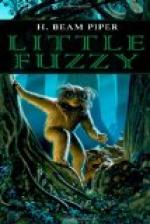“Good engineering, too,” Jack said. “They understand balance and center-of-gravity. They’re bracing it well, and not making it top-heavy.”
“Jack, I’ve been thinking about that question I was supposed to ask myself,” Jimenez said. “You know, I came out here loaded with suspicion. Not that I doubted your honesty; I just thought you’d let your obvious affection for the Fuzzies lead you into giving them credit for more intelligence than they possess. Now I think you’ve consistently understated it. Short of actual sapience, I’ve never seen anything like them.”
“Why short of it?” van Riebeek asked. “Ruth, you’ve been pretty quiet this evening. What do you think?”
Ruth Ortheris looked uncomfortable. “Gerd, it’s too early to form opinions like that. I know the way they’re working together looks like cooperation on an agreed-upon purpose, but I simply can’t make speech out of that yeek-yeek-yeek.”
“Let’s keep the talk-and-build-a-fire rule out of it,” van Riebeek said. “If they’re working together on a common project, they must be communicating somehow.”
“It isn’t communication, it’s symbolization. You simply can’t think sapiently except in verbal symbols. Try it. Not something like changing the spools on a recorder or field-stripping a pistol; they’re just learned tricks. I mean ideas.”
“How about Helen Keller?” Rainsford asked. “Mean to say she only started thinking sapiently after Anna Sullivan taught her what words were?”
“No, of course not. She thought sapiently—And she only thought in sense-imagery limited to feeling.” She looked at Rainsford reproachfully; he’d knocked a breach in one of her fundamental postulates. “Of course, she had inherited the cerebroneural equipment for sapient thinking.” She let that trail off, before somebody asked her how she knew that the Fuzzies hadn’t.
“I’ll suggest, just to keep the argument going, that speech couldn’t have been invented without pre-existing sapience,” Jack said.
Ruth laughed. “Now you’re taking me back to college. That used to be one of the burning questions in first-year psych students’ bull sessions. By the time we got to be sophomores, we’d realized that it was only an egg-and-chicken argument and dropped it.”
“That’s a pity,” Ben Rainsford said. “It’s a good question.”
“It would be if it could be answered.”
“Maybe it can be,” Gerd said. “There’s a clue to it, right there. I’ll say that those fellows are on the edge of sapience, and it’s an even-money bet which side.”
“I’ll bet every sunstone in my bag they’re over.”
“Well, maybe they’re just slightly sapient,” Jimenez suggested.
Ruth Ortheris hooted at that. “That’s like talking about being just slightly dead or just slightly pregnant,” she said. “You either are or you aren’t.”
Gerd van Riebeek was talking at the same time. “This sapience question is just as important in my field as yours, Ruth. Sapience is the result of evolution by natural selection, just as much as a physical characteristic, and it’s the most important step in the evolution of any species, our own included.”




